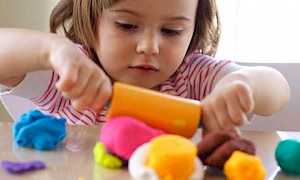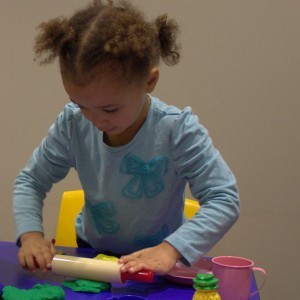Playdough is a common children’s play activity which can be made or bought from the store. Playdough is a great tool for developing fine motor skills in children such as:
- shoulder, arm and hand strength
- bilateral integration (the use and integration of both sides of the body together)
- coordination
- hand eye coordination and visual-perceptual skills
- manipulation skills
- grasp development
It is important to develop a strong foundation of these skills for activities such as writing and cutting and playdough is a fun way to do this. Playdough is also great for those children seeking tactile and proprioceptive sensory experiences.
Here’s a simple recipe to make your own playdough at home with your children from the DIY natural website:
Ingredients
- 1 cup of flour
- ¼ cup of salt
- ½ cup of water
- 3 to 5 drops food colouring
Instructions
- Mix together the flour and the salt.
- Mix together ½ cup of warm water with a few drops of food colouring.
- Slowly pour the water into the flour mixture, stirring as you pour. Stir until combined, then knead with your hands until the flour is completely absorbed. If the dough is too sticky, add more flour until it doesn’t stick.
Hint: You can even try adding essential oils to your playdough for an added sensory experience!
Some fun activity ideas for use with playdough include:
- Rolling the playdough into snakes using both hands together or a rolling pin (a great one for bilateral integration skills)
- Rolling the playdough into small balls
- Pretend cooking and eating with the playdough using kitchen utensils such as a plastic knife and spoon and cookie cutters (also a great one for developing pretend play and self-care skills)
- filling in the blanks of pictures on “playdough printable mats” which can be downloaded free off the internet (google image search “playdough printable mats”), they can be laminated for durability if you have access to this
- making animals out of playdough
- filling a shallow baking dish with playdough and using fingers to push down and write letters in the playdough
- cutting the playdough
- decorating the playdough with toothpics, beads, eyes etc.

If you are concerned about your child's fine motor skills an occupational therapist is the person to see for advice. Occupational therapist can assess your child's skills and advise you on what to do to help your child's development www.talkingmatters.com.au
Blog written by Rebecca Appleby, Occupational Therapist
Related Blog Posts
If you liked this post you may also like:
Following Daily Routines
Beginning questions
Ready to Write
Mr Snowman's Facial Expressions



